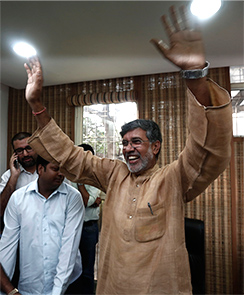 ‘Today, when Kailash Satyarthi is being honoured with the most prestigious global award, reports appear to the effect that many millions of Indian children are in ‘slavery’. This is hardly the reputation that India should have when we are basking in the glory of ‘Mangalyan’,’ says T P Sreenivasan.
‘Today, when Kailash Satyarthi is being honoured with the most prestigious global award, reports appear to the effect that many millions of Indian children are in ‘slavery’. This is hardly the reputation that India should have when we are basking in the glory of ‘Mangalyan’,’ says T P Sreenivasan.
The announcement of the Nobel Peace Prize for India's Kailash Satyarthi and Pakistan's Malala Yousafzai during serious India-Pakistan border skirmishes led to speculation that it was meant to urge India and Pakistan to stop firing across the border and move to the negotiating table, though the decision was taken long before the present ceasefire violations by Pakistan.
The Nobel Committee is being portrayed as a peacemaker. Malala herself has dramatised the situation by inviting the prime ministers of India and Pakistan to attend the Prize ceremony in Oslo.
This is far-fetched because the award has nothing to do with India-Pakistan relations or the border conflict. India would reject any such linkage as it is likely to lead to external intervention.
Another twist to the award was added by the Nobel Committee by referring to a Hindu in India and a Muslim in Pakistan struggling together for the rights of the children, reflecting the stereotyped approach to the religions in the two countries.
Satyarthi himself has denied that his work had anything to do with his religion.
Both India and Pakistan are legitimately proud of their Nobel laureates of 2014, but the award may reflect some prejudices about the subcontinent.
Except in a very few cases, the Nobel Prize for Peace has become a disruptive tool of intervention in the developing world. In the present case, the motivation was not just to honour two exceptional achievers, but to invite attention to the miserable state of children in India and Pakistan, without any regard to the social and economic conditions in the two countries.
Often, such attention can lead to new conditionalities for development assistance.
It was the European Parliament, not any Indian entity, which nominated Kailash Satyarthi for the Nobel Prize. His long list of awards have come from the US, Italy, Germany and Spain.
The reason is that Satyarthi’s struggle for the rights of the children in India was used as a part of the western agenda to impose their standards on India.
At the UN and in the US, we have been bombarded about child labour with the material and evidence given to them by Satyarthi and his organisation. Like Amnesty International and Human Rights Watch, Satyarthi's work has often embarrassed India by challenging the reports we have submitted to international organisations.
India has been a champion of the International Convention on the Rights of the Child and Indian representatives largely wrote it. But the formulation in it on child labour made it difficult for us to sign and ratify it.
Totally forbidding any employment of children below the age of 14 in any sector would be neither practical, nor desirable, in India.
India tried to sign the convention with a reservation on the child labour clause, but this was not acceptable to the UN. While India was exploring various ways to join the convention, we were under severe pressure from various international NGOs.
Eventually, we signed and ratified the convention on the understanding that we would implement the child labour clause in a progressive manner.
In the US, the then President Bill Clinton had also campaigned for the abolition of child labour in India, using the work of Satyarthi and others to prove that India had no concern for the plight of Indian children.
The ‘Rug Mark’, instituted by Satyarthi to identify Indian carpets which were made without child labour, resulted in the reduction of carpet exports from India.
This had become an irritant in India-US relations even when Clinton was forging new ties with India. The memories of the miserable conditions of children during the Industrial Revolution in Europe should have tempered the criticism against India.
Today, when Satyarthi is being honoured with the most prestigious global award, reports appear to the effect that many millions of Indian children are in ‘slavery’. This is hardly the reputation that India should have when we are basking in the glory of ‘Mangalyan’.
That India is conscious of the rights of its children and that every effort is being made to end child labour is lost in the bustle of an Indian winning the Nobel Prize.
Satyarthi’s comments after winning the prize on a recent case of alleged child trafficking in Kerala without evidence has angered many in the state.
Malala Yousafzai was widely believed to win the Nobel last year but, to the disappointment of her admirers, the award went to the Organisation for the Prohibition of Chemical Weapons (OPCW) in the wake of the destruction of chemical weapons of Syria.
One of the reasons cited for not giving the Prize to Malala last year was her young age and the fear that the prize might provoke the Taliban to hurt her.
These considerations are still valid, but the pressure to give her the prize came from very powerful groups, essentially because of clever marketing by her father. She had captured the imagination of the West because of her book and her acclaimed speech at the UN. Her courage and near sacrifice are unparalleled and she fully deserved the prize.
The interventionist aspect is evident in the case of Malala as well. The stereotyped image of Islamic countries consists of denial of education to women and prevalence of terrorism. Nothing illustrates this image more than the Malala incident.
It is believed that she survived basically because she was shifted to Birmingham and received outstanding medical treatment. Pakistan is certainly embarrassed that Malala has received such international attention.
Even though Malala aspires to political leadership in Pakistan, she has not chosen to return to Pakistan. Her Nobel Prize is the second in the history of Pakistan, which makes the country feel proud, but not without a tinge of embarrassment.
The Nobel Prize for those who have many more years in social activism can cause complications in their work. Their dramatic rise in stature may impel them to be more daring. Unless they measure their steps carefully in the future, their messianic zeal may hurt rather than help their causes.
Journalist Praveen Swami went to the extent of saying that the prize is ‘ephemeral, arbitrary and ultimately banal’ and not different from beauty contests. This may be an exaggeration, but for both India and Pakistan, the Nobel Prize for Satyarthi and Malala may be a mixed blessing.
Ambassador T P Sreenivasan is a former Ambassador of India and Governor for India of the IAEA, Executive Vice-Chairman, Kerala State Higher Education Council, Director General, Kerala International Centre. More columns by TP Sreenivasan.
Image: Joint winner of the 2014 Nobel Peace Prize, child rights activist Kailash Satyarthi. Image: Adnan Abidi/Reuters.











 © 2025
© 2025